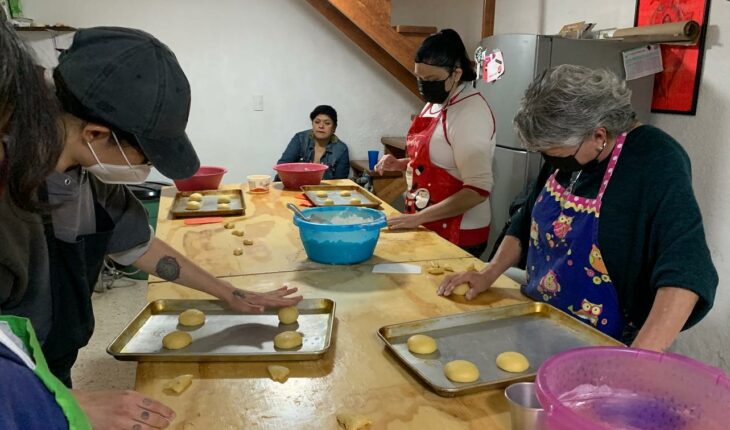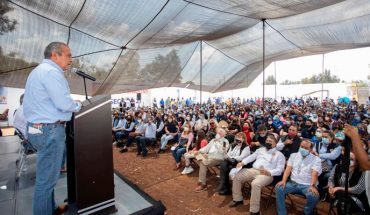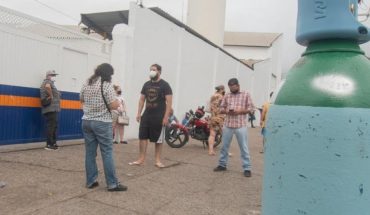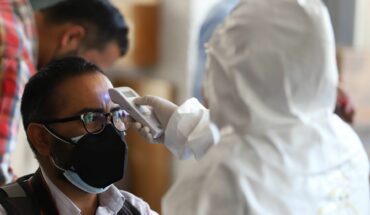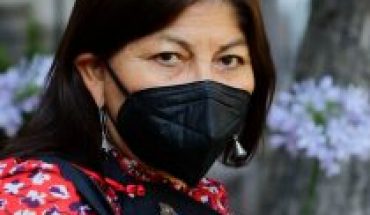In the heat of the oven, women meet every 15 days to talk about their lives, their families, the violence they experience and find therapeutic alternatives in the bakery ‘Las Panas’, where they are also trained to learn and perfect the art of bread.
It all started in 2016, in the kitchen of the apartment where Rosalía Trujano, founder of the project, lives. “When I moved to downtown (Mexico City) I came to live alone and thought, how can I protect myself? Because it is an area of a lot of commerce, tourist, but it is also unsafe, especially at night. Then it occurred to me to invite my neighbors to make bread,” she says.
Her intention, in principle, was to ask her neighbors about the dynamics of the neighborhood where she had recently moved, and to “map” – locate geographically – the places that they recognized as dangerous for women.
Read: Indigenous women organize to get what’s fair for their work
“I am a psychologist and I have a master’s degree in social work. I am dedicated to doing intervention programs in vulnerable populations. With that training, the first thing that occurred to me was to map unsafe places for women, but it wasn’t. As they had lived in the area for a long time, it did not seem risky, but I realized that they needed to talk about their family, economic issues and violence, although they did not name them that way,” he says.
“And I, as a psychologist, felt the need to give something back to them because of those concerns they brought out in space.”
Solidarity bakery
The project has had different venues, because the number of women registered made the space in the department of Rosalía insufficient. Currently ‘Las Panas’ work in a place located in the Santa María la Rivera neighborhood.
Thanks to the fact that she has collaborated in civil society organizations, and currently directs one, Rosalía has achieved that, from 2016 to date, the bakery and psychological support project for women has a budget to operate. Sometimes with the support of international financiers, others with resources from the capital government, and also thanks to the sale of the products they make, as well as bakery workshops.
“I’m not a baker, I’m a bread aficionado, I love to eat bread… but I am a psychologist and what I do are methodologies, and give and support therapeutic processes. That’s why I looked for a bread expert. With Dari, the first companion, we began to open much more structured workshops, with certain breads and with a program to talk about self-knowledge and recognition of violence,” she says.
Now, in ‘Las Panas’ not only workshops and psychological therapy are given, but also the women they support are connected with other bakeries, who are part of a network of establishments with a social cause, where they can continue to perfect their skills and find work or start their own businesses.
Monserrat, one of the women participating in the ‘Las Panas’ project, says that the experience in the organization has been very rewarding, because “it is not only about bread, but about psychological accompaniment. All of us who are here come with some difficult situation, or with the stress of everyday life.”
He has been with them for four months. She says that she came to the project through a Facebook page where her works and services are published to sell and barter: “I saw that they put that they had a bakery principle workshop for women from the State of Mexico with some visual disability and I applied because I am from Tlalnepantla.”
Before that, the bakery was for her only a hobby: “in my house I have always tried to make recipes, learn on my part, but I had not had a formal course.”
As a freelance translator, Monserrat was without projects. He had just finished a diploma course and thought the bakery was an opportunity to look for new sources of income. The therapy was a bonus.
“I find manual work, in general, very satisfying. I have realized that although it is always the same recipe and we follow the same steps, the doughs come out different because everyone carries a different energy and that affects a lot how the bread is. It is also therapeutic to be accompanied by other women who are going through complicated situations,” she explains.
“Bread becomes a pretext to get together and give us a moment for ourselves. I don’t have the same situation as other women who already have children or families to take care of. For them, it’s a time when they don’t have to think about something else. Just making the bread is already therapeutic,” he says.
At the moment, Monserrat is a volunteer at ‘Las Panas’, and at another bakery that is part of her network. There he learns to make new bread figures and, in return, he can take home several of the pieces, to sell or cons.umir.
“I’m not selling the bread directly, I don’t have a business, but I do get a reward. I bring bread to my house and I also help cooperatives. By the way, I consume a better product, so I feel that it does affect my life and my economy in a positive way.”
Facebook Las Panas
Women who help women
In addition to receiving funding, ‘Las Panas’ work with a model of open workshops: some women pay to take the classes, and with the money they give they help those who do not have the resources to afford them to take them as well.
So far, Rosalía estimates that around 500 women have passed through to whom they have given free care. In addition to receiving psychological support, they channel to public institutions or other social organizations those who require long-term help or a particular issue.
“The main intention of this project is to accompany women so that they can know other ways of relating and recognize situations of violence. Open the possibility that with their tools, and new ones that they learn, they will get ahead when they feel ready. That a support network is created and that they know that they are not alone,” says Rosalía.
Currently, ‘Las Panas’ advertise their workshops and the sale of their breads through social networks. However, they intend to establish a fixed place where some of the women who have passed through their ovens can find a source of employment.
“We want to resignify a space that was previously almost obligatory for women, we were confined there, but now it is known that in those spaces where knowledge and emotions are also exchanged. It also allows us to resignify relationships between women.”
What we do at Animal Político requires professional journalists, teamwork, dialogue with readers and something very important: independence. You can help us keep going. Be part of the team.
Subscribe to Animal Político, receive benefits and support free journalism.#YoSoyAnimal

